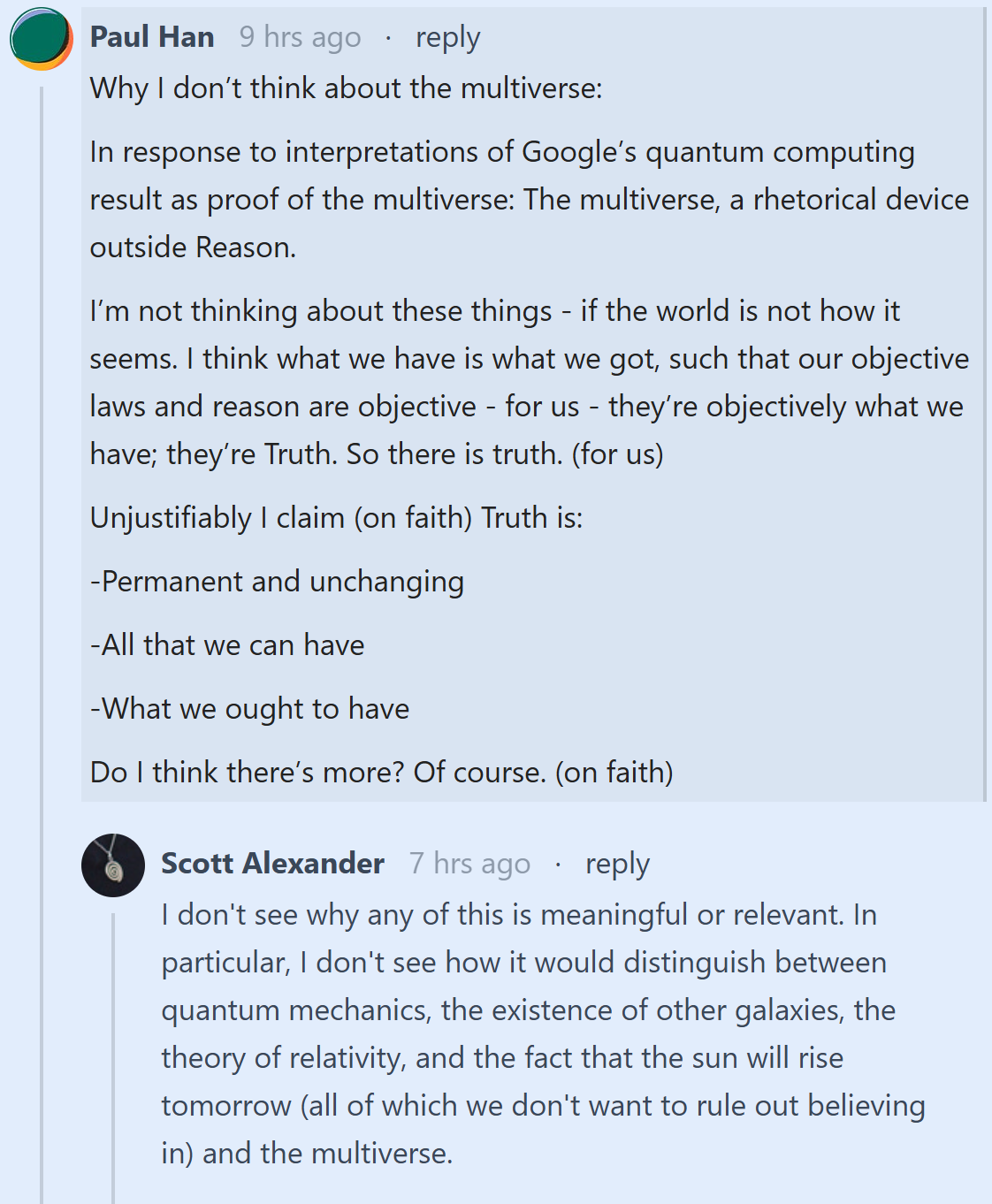Rebuttal to Scott Alexander
"Quantum computing as proof of the multiverse?" An incoherent question in bad taste
The multiverse debate isn’t distasteful for its ideas, but for their misuse
A quantum stock rally was triggered by Google’s announcement that Willow, their new quantum chip, had solved a 10-septillion-year problem in just five minutes. These infinity-in-a-coffee-break problems are actually routine in quantum computing - impressive, not yet useful. Most people in our world knew this, so the real debate wasn’t about the numbers. Instead, they questioned whether this breakthrough was evidence - using the pointed term - of the multiverse. At first, I dismissed it with a hazy thought: it all felt in bad taste — something off.
What crystallized my thinking was an ACX comment that took a cross-country leap from the scientific question of why electrons all have the same properties to the claim that “the universe must be one.” It felt less like science and more like a misuse of science’s aesthetic to justify metaphysical speculation. there’s a gap
The question of why electrons have the same properties is a valid scientific inquiry. But leaping from this to metaphysical unity—"the universe is one"—misappropriates the language of science. The word "one" here isn’t like "one apple" or "four donuts"; it’s a metaphysical term that resists definition within a framework where evidence or proof can apply.
Taste, to me, is coherence—expressing good ideas with the right tools. Quantum computing and the multiverse are beautiful ideas, but misapplying science to metaphysics is aesthetically distasteful. It’s not honest.
Asking whether quantum computing is evidence of the multiverse is like asking if electrons are evidence for "The One," or if there’s evidence for God. Even if such evidence were in our faces, we wouldn’t recognize it—we couldn’t. These terms exist in a conceptual space where evidence and Reason simply don’t apply. It’s an illegal use of sentence structure! The multiverse debate is a rhetorical performance, not a genuine inquiry into what we can know.
This is my critique of scientism: it desperately misuses tools meant for empirical inquiry to avoid engaging with metaphysical tools, which it deems not only outdated or irrelevant, but dangerous. To proponents of scientism, moving from metaphysics to science isn’t like upgrading from sulfa drugs to penicillin—it’s discarding cauterization for sutures. That’s a mistake. Metaphysics isn’t outdated—it’s a different tool for a different task. Taste demands honesty and coherence, and scientism lacks both.
I think quantum computing will bring step changes. I hope we’re in a multiverse. I believe in better living through chemistry. But misusing science to make metaphysical claims feels not only wrong but distasteful. It betrays a lack of honesty about the limits of Reason and our smallness within the universe. Science thrives when it operates within the bounds of what we can observe, reason about, and conceptualize. The multiverse doesn’t belong there.
Rejecting the multiverse as “outside Reason” is not rejecting science— it’s rejecting a rhetorical performance dressed up in scientific language. Science and metaphysics are different tools for different tasks. The multiverse doesn’t belong to science. The other tool has its place.
I find that menswear clothing guy on Twitter incredibly annoying.
Original Piece:
Why I don’t think about the multiverse:
In response to interpretations of Google’s quantum computing result as proof of the multiverse: The multiverse, a rhetorical device outside Reason.
I’m not thinking about these things - if the world is not how it seems. I think what we have is what we got, such that our objective laws and reason are objective - for us - they’re objectively what we have; they’re Truth. So there is truth. (for us)
Unjustifiably I claim (on faith) Truth is:
-Permanent and unchanging
-All that we can have
-What we ought to have
Do I think there’s more? Of course. (on faith)




You seem to draw the distinction between scientific and metaphysical in a different place than I do. Why is it any more "metaphysical" to notice scientific evidence of multiple universes, than it is to notice scientific evidence of multiple galaxies?
If you are over-indexing on the fact that the evidence of multiple universes is not directly sensory but requires some additional steps, see https://slatestarcodex.com/2019/11/06/building-intuitions-on-non-empirical-arguments-in-science/ and https://slatestarcodex.com/2019/11/18/more-intuition-building-on-non-empirical-science-three-stories/ for my response.